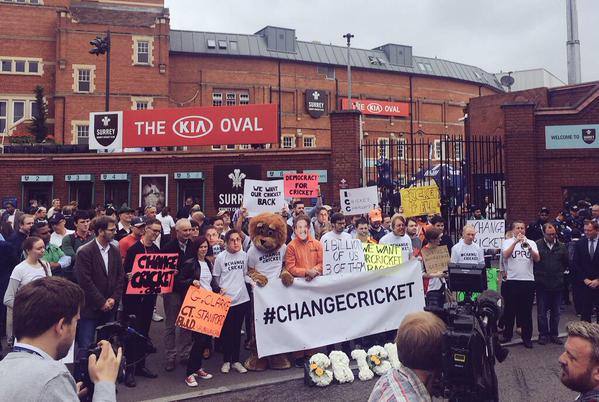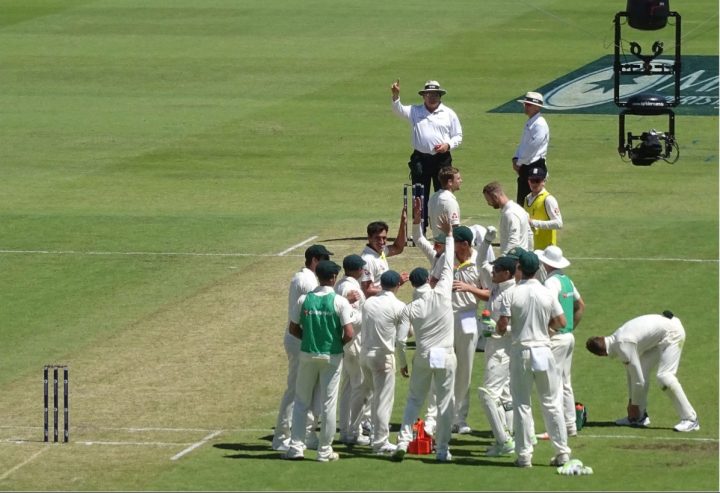At 10am yesterday morning, a protest against the ICC power grab took place outside The Oval’s Hobbs gate. A few journalists (predominantly the younger ones) and a squad of photographers were there to cover the event. They wore Giles Clarke masks and carried placards bearing the slogan #changecricket.
These people care deeply about the future of the international game. They don’t like seeing the rich get richer, while test cricket elsewhere in the world slowly dies. Their arguments are fair and heartfelt.
Inside The Oval, in more salubrious surroundings, Sky’s cricket coverage for the day got underway. It started at 10am too. With play not scheduled to start until 11am, they had a full hour to talk about the future of test cricket and the other major issues facing the game. We waited with bated breath.
So what did Sky have to say about the protest just a few metres away – a protest that called for accountable and transparent ICC governance, global revenues to be shared equitably, and for the ICC to be run by someone who hasn’t been censured by India’s Supreme Court?
What did Sky’s panel of experts think about the contraction of the 2019 World Cup, the fact that major competitions will only held in England, India and Australia in future, or even the ability of the West Indies, Sri Lanka and Pakistan to send competitive teams to England to compete in test series Sky presumably wants to broadcast?
I think you can guess the answer. Even though these are all burning issues – they were, after all, the primary concerns of Lord Woolfe (an independent observer) when he wrote his report on ICC governance a couple of years ago – Sky’s team said absolutely nothing. Nada.
No wonder cynics have started referring to Sky’s Ashes channel as ‘ECB TV’. Instead of discussing the big issues, they spent twenty minutes talking about the ECB’s pin-up boy, Alastair Cook. None of this is Alastair’s fault, of course – as captain he has to fulfil his media commitments – but anyone who cares deeply about the future of cricket should have been outraged.
When it came to the crunch – at a time when serious journalists were covering the protest at the Hobbs gate – Sky turned their backs on everyone other than their business partners. They didn’t even think the protest warranted a mention. Instead the implied message was clear: all is well, we won the Ashes. There’s nothing to see here other than another tedious montage set to a cheesy soundtrack and highlights of Joe Root doing a Bob Willis impression.
We tweeted Sky asking for an explanation, and wondered whether they might mention the protest at tea instead? We got our answer a few hours later when the ECB’s new CEO Tom Harrison, sweating like Richard Nixon, popped into the Sky box for a fireside chat with David Gower.
Harrison wasn’t asked one question about the protest earlier or indeed anything about the ICC or the future of test cricket. Instead he rambled unconvincingly about appeasing various ‘stakeholders’ within the domestic game. I don’t recall him mentioning supporters once, apart from a brief reference to people paying their Sky subscriptions.
Harrison was a busy boy yesterday. He had a much longer interview with Jonathan Agnew on TMS at lunchtime. This time he was asked some more awkward questions. After all, TMS had the decency (or should that be temerity) to tweet about the protest in the morning.
Harrison’s answers, however, were as disingenuous as one might expect from the CEO of an organisation that has stitched up world cricket in order to further its own interests.
Here’s a brief synopsis of the Aggers interview. Forgive me for paraphrasing. You can hear the original interview here.
JA: Some of the things that have happened at the ICC are controversial. What do you say to that?
JH: Well, the ICC is a separate thing to the ECB. It’s not really my place. Nobody cares more about the future of test cricket than the ECB.
And there was me thinking that the ECB are one of only three permanent members of the ICC’s new Executive Committee. Pull the other one, Tom.
JA: Have you seen the film Death of a Gentleman?
JH: No.
Well, why would he see it? He’s only the CEO of the ECB, a board who have a responsibility to look after the domestic and global game. Why would he be interested in a film that’s in the news and talks about the game’s future?
JA: What do you make of the protest outside?
JM: I find it interesting that we’re talking about a future vitality of test cricket when we’ve got a full house here today and we’ve sold out every Ashes test this summer.
Harrison knows full well that the issue isn’t the health of test cricket in England. The issue is that test cricket dying in other parts of the world, where impoverished boards are now receiving even less money to grow the game. I hope he wasn’t deliberately trying to hoodwink the casual observer.
JA: Do you think it’s fair that India and the Big Three have restructured the ICC to ensure they get a large share of the pie?
JH: Not everyone is going to agree with this but I think it’s “laudable” that the country that generates the most money (India) gets the most money.
That’s right folks, he thinks it’s “laudable” that the rich are getting richer and the poor are getting poorer – even when this puts the global game at risk (a game he claims to love).
JA: Was it really necessary to restructure the ICC?
JH: Yes of course. If we hadn’t come to an agreement with India, they would have simply withdrawn from all international cricket. They threatened to do so. It would’ve been a disaster!
This is the line Giles Clarke always peddles. It’s nonsense of course. The idea that India would simply withdraw from world cricket, only focus on domestic cricket, and no longer take part in the World T20 or World Cup is ridiculous. The Indian fans would be up in arms. What’s more, India have threatened to do this before, and it’s always been a poorly disguised bluff. Harrison is either being naïve or economical with the truth.
It’s times like this when you wish Jeremy Paxman would suddenly emerge from behind the sofa, put on his best condescending voice and really skewer the wriggling, evasive interviewee. He’d never let someone like Harrison get away with such misleading answers. Credit to Aggers for asking some tough questions, but someone with a more aggressive disposition would have gone for the jugular.
Instead Harrison walked away relatively unscathed, with his expensive suit unruffled and few of his answers followed up. One worries how many cricket lovers (those don’t have time to keep up to speed with cricket politics) would have been fooled by his politician’s answers. It hardly seems fair.
At least the BBC were prepared to raise the issues though. Other than a brief segment on Cricket Writers on TV, in which Mike Selvey tried to pick holes in Death of a Gentleman’s thesis rather than expressing concern at the film’s findings (he later admitted on Twitter that he hadn’t even watched the film), Sky have ignored the big questions entirely.
But perhaps we shouldn’t worry. We won the Ashes after all. The rest of the cricketing world – the West Indies, South Africa, Pakistan, New Zealand, Sri Lanka, Bangladesh, plus the other 95 associate and affiliate nations – can apparently go to hell.
James Morgan
@DoctorCopy









get MCC member and cricket lover Andrew Neil to interview him – he’d rip him to pieces
For info, link to TMS
http://www.bbc.co.uk/programmes/b0668xcc
it’s commentary mainly but lunchtime discussion is about 02hr30 mins in
Harrison is nasty, arrogant and a liar
Liar is stong, but he’s certainly giving politicians’ answers and not disclosing the whole truth.
Spot on comments in this article about the need for people like Harrison to be interviewed by someone who will actually challenge them. A sad state of affairs that the closest we get is Aggers, who clearly resents much of what has gone on in the game but is so conflict averse that you can hear his relief once he’s stammered out a controversial question. Sadly he then just listens to the response and moves on, rather than challenging even some of the more ludicrous nonsense spouted yesterday by Harrison. Sadly “Phew, I managed to get it out” is about as interrogative as Aggers gets.
Harrison himself is the classic corporate toady. A master of talking for 30 minutes without saying anything whatsoever. “Stakeholders”…”shop windows”…cliches, jargon…after his interview yesterday I googled him – dark haired, clean-cut and good looking, he looks exactly how I had imagined. I’ve seen so many unprincipled men like him brown-nose their way to the top during my career. His primary skill is an ability to toe the party line and peddle bullshit with a straight face, whether he believes it or not, because he knows it will advance his own career and line the pockets of the chosen few. Everyone else can go to hell. Tony Blair, of course, is the master of this. Try saying (to paraphrase Harrison yesterday) “the bulk of cricket revenue should go to India because they needed to build a following in the country and otherwise would have walked away from the world game” and look like you believe it. I can’t do it…can you?
Its along the same lines as “If we tax these huge multinational companies at the same rate we tax small British businesses they will just leave Britain”
Trying to take the positives first – I’m pleased Harrison is more supportive of cricket in the Olympics and it was also good to hear a rejection of the ‘win at all costs’ mentality that characterised late Flower-ism.
Errr, that’s all I can come up with on the positives. A few random points about the rest:
1) Harrison claimed India raise “80-90%” of ICC revenue. Where does that figure come from? A figure of 70-80% appeared in an ICC document last year without any supporting evidence and was roundly criticised by a number of Indian journalists. Has Harrison just added another 10% because it suits his argument? Agnew didn’t challenge him on this.
2) Harrison evaded the negative image of the ECB by turning it into a question about the England team. On the same basis, Sangakkara justifies the SLCB, Misbah justifies the PCB, Messi justifies FIFA and Bolt justifies the IOC. I’m not quite sure how but it has something to do with “shop windows”. Agnew didn’t challenge him on this.
3) Harrison evaded the issue of the ten-team WC by going on about the other things the ECB or ICC are doing for associates. It is not either/or. Other measures to help associates should make them better teams more capable of adding to a WC (as happened six months ago). The two go together. Agnew did at least sound a little angry about the treatment of Ireland.
4) ‘Top down’ declarations of a “reconnection” aren’t how reconnections work. Agnew was too busy agreeing to challenge this one.
5) How is a 14 f/c match CC schedule going to work? Won’t the teams that play, for example, Yorkshire once be hugely advantaged?
6) I appreciate time was limited but there were issues not raised – like the deal to make Giles Clarke President or the international schedule.
Generally, Harrison came across as knowing the price of everything and the value of nothing. The use of the sort of management-speak (“getting the right people on the bus” was a personal favourite) that many of us, as others have pointed out before, have to put up with in our working lives and hate the way it’s leeched into sport shows they still haven’t got past first base in improving their communication.
Agreed Simon.
Why is it that absolutely everyone in any position of responsibility within the ECB is an absolute bellend? It can’t be a coincidence, surely. They must actively recruit for A1 pricks with demonstrable and proven experience in lying, obfuscating, leaking and backroom deals.
Can’t think of any other explanation!
Of course. Like most organisations, they will recruit primarily based on “cultural fit”, while of course pretending their criteria are competency-based. So if you turn up to interview and challenge what they’re doing, you won’t have a prayer. That’s why everyone fits the same mould. I’d hoped it might start to change under Colin Graves, but no sign as yet. The shadow of Giles Clark, the ultimately bully-boss , looms large. If you’re not a “Yes Man”, you’re stuffed.
Harrison worked for IMG – he is a specialist in sports rights – specifically, in hawking them for as much as possible.
Yes, I read about him yesterday. Having nearly made me crash my car on the A3 due to the fury his interview induced, his profile then made me sick when I got home. He was “the unanimous choice of the board” according to Giles Clark. You bet he was…
Indeed, and in some ways he is only doing what he was clearly expressly hired to do: maximise short term income from sky over the next 10-15 years and to hell with everything else and everyone else.
But it really does make you wonder whose idea it was that this would be a suitable strategy?
Oh wait, don’t answer that, I already know. Unfortunately I think Colin “costcutter” Graves just represents more of the same greedy, stupid, selfish, short-term thinking.
Andrew Strauss was appointed for this very reason. The fact he’s too close to the dressing room etc was overlooked because he’s the right cultural fit. I hope Strauss does a good job, and I’m not anti-Strauss at all, but I believe the reasons he was appointed stink.
The public gets what the public wants.Time to go underground?
The ECB have made their bed, now they can lie in it :-)
Did Tom Harrison say anything about putting test match cricket back on free-to-view terrestial TV ? This for me is such an important issue. It just isn’t right that the great sport of cricket, our nation’s national summer sport, is no longer viewable to those who don’t pay for SKY TV, apart from the enjoyable, but all-too-brief Channel 5 highlights programme. No wonder I never see any kids playing cricket in the local parks. Turn back the clock ten years to the famous 2005 Ashes series and I can remember seeing quite a few children playing cricket in the park, some with their fathers. They were inspired by the likes of Freddie Flintoff and Kevin Pietersen, but how many of today’s youngsters are getting a chance to watch Root, Broad and co this summer ?
They did discuss this and it’s an absolute no go. The ECB aren’t even considering putting live cricket back on FTA. Not long ago Harrison actually said FTA channels in the modern age are ‘irrelevant’.
A father tweeted Jonathan Agnew yesterday, saying that he and his son had a Sky day pass for the first day at Trent Bridge. His son, on seeing Broad, apparently said “That makes me want to play it now.”
I loathe Harrison and his ilk: they represent some of the worst developments in modern British life.
What sickening arrogance. Not everyone can afford or even wants SKY. I am not the home owner where I live, and cannot afford SKY. I rely on the TMS commentary, Channel 5 highlights and reports in the press, and the excellent TFT of course. My father used to love watching the cricket in the eleven years between his retirement and the end of free-to-air. He is typical of many elderly people who don’t have SKY and who really miss seeing the cricket live. Large sections of cricket supporters are being let down by this. Given that cricket coaching is no longer available in most state schools, you do wonder how the ECB thinks that future generations of players are expected to emerge. What a bunch of muppets the ECB are.
Don’t have a SKY either. Just don’t have the money; it’s that simple. And I know the ECB doesn’t give, well, a toss!
Its the fact that no cricket of any sort is available free to air that hurts the most. I remember 1992 and Sky taking top flight football. Growing up in a family who would not buy Sky at least I could still watch internationals, Champions League and second tier football to sustain my interest in football. What can anyone in the same boat do now to watch cricket?
That’s spot on Ian. The other major sports that have sold out to sky at least have some FTA live coverage. Rugby, for example, still has the six nations and World Cup on FTA.
I wish more former players would speak out about this issue of no free-to-air TV live cricket. I seem to remember Mike Gatting expressing concerns about it at one point a few years ago. Cricket is supposed to be our national summer sport in this country and yet it gets no free-to-air coverage apart from Channel 5 highlights. What is it that broadcasters don’t like about cricket ? It would only be replacing endless anodyne space-filler TV such as Flog It!, Location, Location, Location, Escape to the Country etc. Older retired cricket fans would be delighted to see it on their screens again and some youngsters would definitely be fascinated by the ebb and flow of the game, as I was as a child in the 1970s. Aggers himself was inspired to become a professional cricketer partly by watching the test matches on TV, “with the curtains drawn” as he once described it. I wonder what the actual figure is for people who have seen this summer’s cricket live on TV as compared to viewing figures for, say, Wimbledon, the Six Nations, Champions League etc.
Of England’s full-time captains since January 1980, six work or have worked for Sky, two work for the ECB (one went from Sky to the ECB of course) and one did so until he was sacked as batting coach.
That might be part of your answer.
Btw, I don’t mean to imply this is an exhaustive list, but it excludes only Brearley, Fletcher, Stewart and Vaughan. Three of whom captained for three and a half full series (and one Test v SL) between them.
Oh, and Flintoff. Who doesn’t make a lot of difference. Basically everyone who captained for more than two full series, except Vaughan, is or was part of the Sky/ECB nexus.
Flintoff works for Sky because he’s a captain on Sky One’s League of Their Own show. Although that’s stretching things a little.
Before play started today, Atherton and Hussain revealed they’d been out with ECB officials the other night.